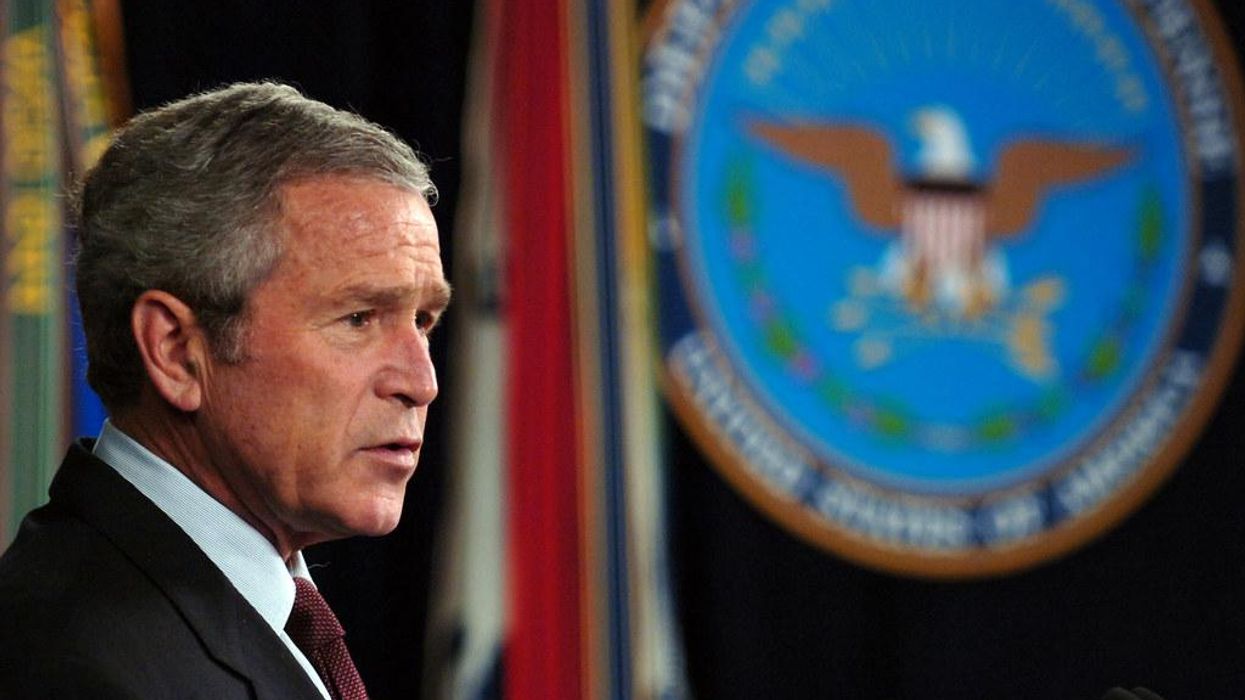Former President George W. Bush
Reprinted with permission from Press Run
A media chorus of excited critics has been relentless this week, denouncing President Joe Biden for the U.S. troop withdrawal from Afghanistan and warning that his entire presidency is now "stained." Tightly adhering to Republican talking points, the pundit class is sure Biden has stumbled into a historic crisis as the Taliban seizes Kabul.
The U.S. has spent trillions in Afghanistan stretching back 20 years, yet Biden, who has been in office for seven months and who campaigned on bringing the troops home, is being tagged as an architect for the Taliban's inevitable rise to power there.
A convenient, gaping hole in the coverage and commentary? The U.S. mission in Afghanistan was unalterably damaged when President George W. Bush hijacked that post-9/11 military mission and foolishly turned the Pentagon's time, attention, and resources to a doomed invasion of Iraq.
Much of the mainstream media cheered that utterly failed war. Battered by accusations of a liberal bias and determined to prove their conservative critics wrong, the press during the run-up to the war -- timid, deferential, unsure, cautious, and often intentionally unthinking -- came as close as possible to abdicating its reason for existing in the first place, which is to accurately inform citizens, particularly during times of great national interest.
Today the media's role in marketing the Iraq War has been flushed down the memory hole, even though Iraq should be central to any discussion about the U.S.'s running failure in Afghanistan. "Remarkably, the word "Bush" was not mentioned once on any of the›Sunday shows" this weekend as they focused nonstop on Afghanistan, noted Jon Allsop, at the Columbia Journalism Review.
You cannot discuss the rise of the Taliban in 2021 without talking about the U.S.'s doomed Iraq War in 2003. But the press today wants to try.
It's another example of how pro-Iraq War cheerleaders in the media not only have paid no price for being spectacularly wrong, but they're still allowed to dictate the parameters of our foreign policy discussion.
"For those of us who remember well how the mainstream media enthusiasm for war helped fuel not just this ill-advised war in Afghanistan twenty years ago, but the even bigger debacle in Iraq, the current media narrative is both bewildering and exhausting," writes Amanda Marcotte at Salon. "This larger media outrage over the withdrawal is a dark reminder of the pro-war bias in the press that helped create this mess in the first place, luring the American public into thinking a war in Afghanistan could ever end in any other way."
It's especially jarring to see the Washington Post and the New York Times lead the way this week with finger-pointing Afghanistan coverage, considering those two outlets played essential roles in supporting the Iraq invasion, which became a turning point for the U.S. presence in Afghanistan.
Why a turning point? Bush drained U.S. resources by launching an unprecedented, preemptive invasion based on the lie that Saddam Hussein was sitting on a stockpile of weapons of mass destruction. Overnight, Afghanistan lost its focus as the U.S.'s military response to the terrorist attack on 9/11. (Under Bush, the U.S. had 10,000-20,000 troops in Afghanistan, compared to roughly 150,000 troops in Iraq during his second term. )
In truth, Bush never could have ordered the invasion of Iraq -- never could have sold the idea at home -- if it weren't for the help he received from the mainstream media, and particularly the stamp of approval he received from so-called liberal media institutions such as the Washington Post, which in February of 2003 alone editorialized in favor of war nine times.
As the Post's independent ombudsman Michael Getler later wrote, the media's performance in 2002 and 2003 likely represented their most crucial newsroom failing in nearly half a century. "How did a country on the leading edge of the information age get this so wrong and express so little skepticism and challenge?" asked Getler.
Against that backdrop of helping stage the Iraq War, it was the Post that recently admonished Biden regarding Afghanistan, claiming his "precipitous withdrawal, as well as his refusal to offer more meaningful assistance to Afghanistan's government, risks disaster."
The New York Times also raced ahead of the pack in 2002 and 2003 to cheerlead Bush's war.
"According to half a dozen sources within the Times, [executive editor Howell] Raines wanted to prove once and for all that he wasn't editing the paper in a way that betrayed his liberal beliefs," wrote Seth Mnookin in his 2004 Times expose, Hard News. Mnookin quoted Doug Frantz, the former investigative editor of the Times, who recalled that "Howell Raines was eager to have articles that supported the war-mongering out of Washington. He discouraged pieces that were at odds with the administration's position on Iraq's supposed weapons of mass destruction and alleged links of al-Qaeda."
The New York Observer later reported, "One senior Washington bureau staffer said that as the Bush administration edged closer to invasion, the editorial climate inside the Times shifted from questioning the rationale for military action to putting the paper on a proper war footing. 'Everyone could see the war coming. The Times wanted to be out front on the biggest story,' the staffer said. 'It became the plan of attack.'"
The United States' two-decade failure in Afghanistan is inexorably tied to Bush's catastrophic Iraq invasion. Not surprisingly, news outlets that promoted the failed war aren't anxious to address it today.









